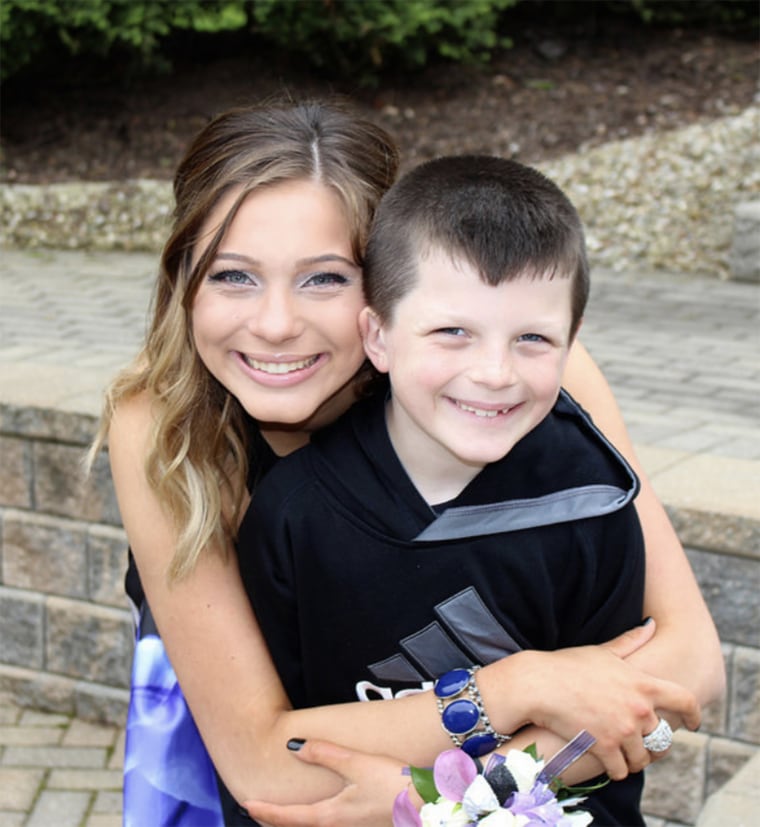After she was diagnosed with a peanut allergy as a toddler, Allison Rose Suhy's family learned how to navigate birthday parties, summer camps, or class snacks — all the usually benign but potentially dangerous moments in the life of a child with a food allergy — by simply eliminating peanuts from her world. They kept Benadryl and EpiPens close by as back-up.
"She went through her life as normal as our two other kids," Allison's father, Michael Suhy, told TODAY Parents. "She missed out on some birthday cake, but it was never the end of the world. She was safe. She really was safe."
The Suhy family did not realize that safety was in jeopardy once Allison left their home in Independence, Ohio, and they now want to help other food allergy families prepare for the same transition.

In the fall of 2017, Allison began her freshman year of college at Ohio University, where Suhy said his daughter "flourished."
"She loved high school, but she really loved college," he said. Fiercely independent, Allison surprised her family by calling home more than they expected, using the FaceTime app to check in with her parents and younger sister Jenna, then 16, and brother Ryan, then 9. She joined a sorority, Alpha Xi Delta, and made great friends. "She was a leader," said her father.
When Suhy went to visit his daughter for his first college "Dads' Weekend" in early November of 2017, he found his daughter settled and happy. The last thing he expected after he kissed her goodbye was the call he received that same night — "the call no food allergy parent ever wants to get," as he described it — telling him his daughter was having an allergic reaction to something she ate at a study break.
Never miss a parenting story with the TODAY Parents newsletter! Sign up here.
At first, Suhy didn't panic. In the past, the worst reactions Allison had were solved by taking a dose of Benadryl. She would be tired afterward, but she was always OK. "Never once had we experienced anaphylaxis," said her dad. "Never once had we needed to use the EpiPen."
But when he heard someone in the background use the word "CPR," Suhy started to get nervous. A 20-year veteran of the fire department and the Fire Chief of Cuyahoga Heights, Ohio, himself, he began to understand the situation might be more critical than he first thought.
Suhy met the paramedics at the hospital, where Allison was already unconscious; she was soon flown from Athens to Columbus, Ohio, for a higher level of care.
Four days later, the doctors let her parents know that the swelling in Allison's brain was too much for her to ever recover, and Allison passed away.
"That was the hardest news you ever get, but then telling our other two kids was equally hard," said Suhy.

When Allison left for college, "We never thought, 'Boy, you're leaving this safety net, this cocoon, we need to arm you with some education and talking points,'" said Suhy. "It never crossed our mind to do that, because she was 17, 18 years old; she could read a label.
"We didn't realize that you should talk to your roommate; you should tell them you have an Epipen and where it is. You should talk to your Resident Advisor," he added. "We never thought to do that."
Almost immediately following her death, Suhy and his wife — Allison's stepmother, Rebecca — decided they wanted to honor Allison's spirit by helping prepare other young adults like her and their families. "She was a helper; she was a giver," said Suhy, who said Allison had been a camp counselor for children with autism and hoped to be a teacher someday. "We wanted to continue her legacy of helping and giving and educating."
The Suhys since created the Allison Rose Foundation to educate other teenagers and soon-to-be college freshmen on how to live safely with food allergies in a college and other settings.
Through education and advocacy initiatives in high schools, universities, and communities, the Allison Rose Foundation will help teenagers with food allergies as well as their non-allergic peers to understand the safety measures and considerations they might not anticipate when they leave their childhood homes.
The foundation will teach young adults to make sure those around them — like roommates or RAs — are aware they have food allergies, where they keep their EpiPens, how to use EpiPens, and the signs and symptoms of an allergic reaction.
"We want them to know you can still live a normal life, but wherever you're going to be, you are going to have to re-educate those around you so you can be safe," said Suhy.
The Allison Rose Foundation will also sponsor a scholarship for a graduating senior at Allison's high school who will serve as an ambassador of the organization on their own college campus.
This month, the foundation will have its kick-off event to raise money for the education programs in development. The Suhys are eager to begin spreading the word that food allergy safety does not automatically follow a young adult to college or elsewhere.
"Allison would be so proud of what's going on," Suhy said. "From the time they were born, I've done everything I can for my kids. I'm still going to continue to do that for Allison."
Suhy is also driven by a wish to spare other allergy parents his grief. "We have walked in their shoes," he said, "and I really don't want them to have to walk in mine."
